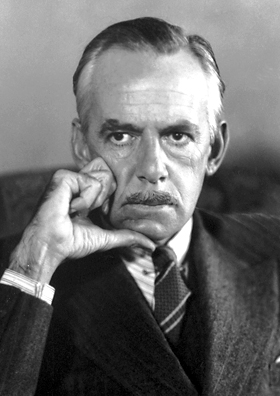Obras
Dynamo
Eugene O'NeillA Electra le sienta bien el luto
Eugene O'NeillA Moon for the Misbegotten
Eugene O'NeillFrases célebres de Eugene O'Neill
“El amor nunca tiene razones, y la falta del amor tampoco. Todo son milagros.”
Antes del desayuno (Before Breakfast), 1916
“Esperar que los otros juzguen con sentido común es una prueba del que nos falta a nosotros.”
Fuente: Noticias de la semana, números 732-744. Editorial Perfil, 1991. Procedencia del original: Universidad de Texas. Digitalizado: 19 de noviembre de 2008, p. 71.
A Electra le sienta bien el luto (Mourning Becomes Electra), 1931
Fuente: Contenido de la obra. http://www.ibdb.com/show.php?id=6266.
“Con las personas que no puedes amar, muéstrate siempre amablemente evasivo.”
Una luna para el bastardo (A Moon for the Misbegotten), 1943
Eugene O'Neill: Frases en inglés
“There is no present or future-only the past, happening over and over again-now.”
Fuente: A Moon for the Misbegotten
John: Act 3, Scene 2.
Days Without End (1933)
Contexto: I listen to people talking about this universal breakdown we are in and I marvel at their stupid cowardice. It is so obvious that they deliberately cheat themselves because their fear of change won't let them face the truth. They don't want to understand what has happened to them. All they want is to start the merry-go-round of blind greed all over again. They no longer know what they want this country to be, what they want it to become, where they want it to go. It has lost all meaning for them except as pig-wallow. And so their lives as citizens have no beginnings, no ends. They have lost the ideal of the Land of the Free. Freedom demands initiative, courage, the need to decide what life must mean to oneself. To them, that is terror. They explain away their spiritual cowardice by whining that the time for individualism is past, when it is their courage to possess their own souls which is dead — and stinking! No, they don't want to be free. Slavery means security — of a kind, the only kind they have courage for. It means they need not to think. They have only to obey orders from owners who are, in turn, their slaves!
John: Act 3, Scene 2.
Days Without End (1933)
Contexto: I listen to people talking about this universal breakdown we are in and I marvel at their stupid cowardice. It is so obvious that they deliberately cheat themselves because their fear of change won't let them face the truth. They don't want to understand what has happened to them. All they want is to start the merry-go-round of blind greed all over again. They no longer know what they want this country to be, what they want it to become, where they want it to go. It has lost all meaning for them except as pig-wallow. And so their lives as citizens have no beginnings, no ends. They have lost the ideal of the Land of the Free. Freedom demands initiative, courage, the need to decide what life must mean to oneself. To them, that is terror. They explain away their spiritual cowardice by whining that the time for individualism is past, when it is their courage to possess their own souls which is dead — and stinking! No, they don't want to be free. Slavery means security — of a kind, the only kind they have courage for. It means they need not to think. They have only to obey orders from owners who are, in turn, their slaves!
Fuente: The Great God Brown and Other Plays
Page 63 (Act 2, Scene 1)
Long Day's Journey into Night (1955)
Fuente: Long Day's Journey Into Night
Contexto: But I suppose life has made him like that, and he can't help it. None of us can help the things life has done to us. They're done before you realize it, and once they're done they make you do other things until at last everything comes between you and what you'd like to be, and you've lost your true self forever.
“Man is born broken. He lives by mending. The grace of God is glue!”
Act 4, Scene 1
The Great God Brown (1926)
“We are such things as rubbish is made of, so let's drink up and forget it.”
Fuente: Long Day's Journey Into Night
Page 100-101 (Act 3)
Long Day's Journey into Night (1955)
Fuente: Long Day's Journey Into Night
“We have electrocuted your God. Don't be a fool.”
Act 2, Scene 1
Dynamo (1929)
“Yes, I remember. I fell in love with James Tyrone and was so happy for a time”
Page 179
Long Day's Journey into Night (1955)
Act 4 http://books.google.com/books?id=YI8iwzZhl6AC&q=%22what+the+hell+was+it+I+wanted+to+buy+I+wonder+that+was+worth+well+no+matter+it's+a+late+day+for+regrets%22&pg=PT133#v=onepage
Long Day's Journey into Night (1955)
Fuente: Long Day's Journey into Night (1955), Page 76 (Act 2, Scene 1)
Loving: Act 3, Scene 1.
Days Without End (1933)
“One may not give one's soul to a devil of hate — and remain forever scatheless.”
Father Baird: Act 3, Scene 1.
Days Without End (1933)
“It has been a long day. Why don't you sleep now—as you used to, remember?—for a little while.”
Act 9 http://books.google.com/books?id=q6JEAAAAYAAJ&q=%22It+has+been+a+long+day+Why+don't+you+sleep+now+as+you+used+to+remember+for+a+little+while%22&pg=PA200#v=onepage
Strange Interlude (1928)
